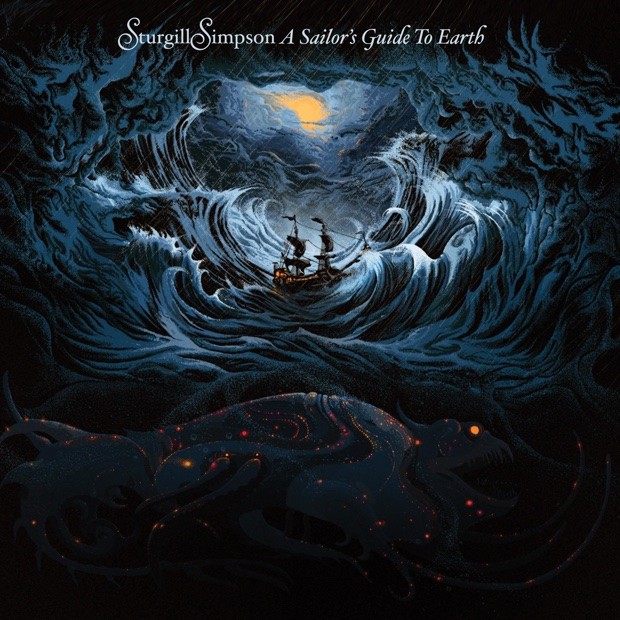It must be a big responsibility, having a voice like the one Sturgill Simpson has. It has to be something like having superhuman strength or the power of teleportation. There's the joy that comes with having this amazing ability, but then there's also the knowledge that you need to use it for good, and the uncertainty of what "good" might even be. It's a voice that sounds distilled and barrel-aged. It's big and heavy and oaky, and it commands instant respect. It has gravitas. But it also has a certain playfulness to it, a good-ol'-boy sense of joy. It's a voice that tells you: "This guy has done some living." And he has. Simpson was in his mid-30s by the time most of us heard of him. He's been around. He's done some things.
Simpson is, in a lot of ways, an absolute vocal dead ringer for Waylon Jennings, the country great who -- Simpson says, anyway -- wasn't all that big of an influence. And on 2014's Metamodern Sounds In Country Music, Simpson mostly sang in that same old-school chest-out roar that Jennings once used. On paper, Metamodern Sounds is a brave formal departure, with its acid-dazed lyrics and its '80s new wave cover. But even though it has all these ideas flying in every direction, Metamodern Sounds is still, musically, a tradition-steeped record, an excellent example of '70s outlaw-country revivalism. Simpson was lucky enough to link up, early on, with Dave Cobb, the producer behind much of the currently in-vogue retro-country wave. After working with Simpson on his first two albums, Cobb went on to produce for guys like Chris Stapleton, the present-day toast of Nashville. A few months ago, Simpson posed for GQ photos with Stapleton and fellow Cobb client Jason Isbell. There's now a market for the full-bloodied revivalism that Simpson was practicing one album ago. The lane is right there. He could take it if he wanted. Instead, he's veered left. On A Sailor's Guide To Earth, he's completely off the road, bumping along some unpaved path to who knows where.
A Sailor's Guide isn't a country album, though country remains a presence on it. You can still hear Jennings in Simpson's voice; you'll probably be able to hear it as long as he's breathing. But that sound coexists alongside orchestral funk vamps and sweaty horn-stab soul and rollicking biker rock. In his recent New York Times profile of Simpson, Jon Caramanica writes that Elvis Presley is a huge influence on Simpson, especially on this album. And while I might not have picked that out on my own, Elvis is all over this thing. When you strip away the jumpsuits and the karate kicks, all the things that made '70s Vegas Elvis an enduring cultural punchline, videos of his late-career performances are really something. They wrap all these competing strains of '70s music into one endlessly compelling whole, all held together by the sheer force of Presley's personality and showmanship. Simpson isn't really a showman, something you know if you've ever seen him live. But he's got the personality to hold all that together on his own, and that's what he does on A Sailor's Guide.
This album is the first one Simpson made without Cobb. Instead, he produced it himself, and he tried ideas that just about any other producer would've rejected. More than half the songs feature the Dap-Kings horn section doing precise, sharp soul riffing. There are beats here, live-room interplay from Simpson's touring rhythm section that reminds me of something that could've come out of the Muscle Shoals studio once upon a time. There are cow-mooing sound effects and explosive acid-rock guitar solos. With his version of "In Bloom," Simpson becomes the first person in years to find an interesting way to cover Nirvana, layering on the weeping strings and bluesy horns, turning it into a lonely mirror-ball waltz.
On Metamodern Sounds, Simpson was so good at classic country sounds that it's a bit of an adjustment to hear him push his voice in all these different directions. At first, it pissed me off; I thought he was misusing that tremendous gift of a voice. After hearing the swamp-rocking first single "Brace For Impact (Live A Little)" and Simpson's generally uninspiring theme song for the TV show Vinyl, I jumped on Twitter and called Simpson's new music "tasteful Godsmack." But in the context of that album, that grungy trudge is just one sonic dimension among many. And even as he veers all over the map, Simpson holds the album together with a simple, emotionally loaded concept.
The concept is this: The album serves as a message to Simpson's 2-year-old son. It's right there in the opening lines: "Hello, my son / Welcome to this earth / You may not be my last, but you'll always be my first." Some of the songs here are straight-up practical fatherly advice, like what Jason Isbell was writing about on the Drive-By Truckers' "Outfit": "Don't turn mailboxes into baseballs / Don't get busted selling at 17 / Most thoughts deserve two or three more / And motor oil is motor oil / Just keep the engine clean." (Some of this advice is hard-won; Simpson did get busted selling at 17.) Sometimes, he's musing on the nature of existence, reminding his son that life is just a dream. Sometimes, he's describing parental love in ways so simple and direct that they make my eyes well up: "Just know in your heart that we're always together / And even when I'm gone, I'm still around."
One thing I love about the album's structure is that it makes room for those deep, emotional moments, but it's not just made up of those moments. Simpson gets wracked with guilt about spending time out on tour: "When I get home, it breaks my heart to see how much you've grown." But he also gives himself time to bullshit around. "Sea Stories" is exactly what its title describes. Simpson, who spent time in the Navy, tells tales of getting shitfaced in Asian port cities, of seeing "king cobras fighting in boxing rings." And he finds artful ways to describe the boredom that that life can bring: "Maybe get high and play a little GoldenEye on that ol' 64." Even the Nirvana cover makes sense in this context; he's thinking about kids trying to make sense of the world around him. As the album ends, Simpson veers away from the concept a little. One song is a straight-up love ballad, and another is a rave-up about how our phones are distracting us from the real problems in the world. Even there, though, he's offering up himself as an example, helping remind his kid (and the rest of us) to keep our priorities straight.
So A Sailor's Guide is a personal album and a brave one, one that flies in the face of convention and does whatever the fuck it wants. There's no real genre category for it, and that's a good thing. It tries out plenty of different ideas, succeeds at all of them, and presents all of them as a cohesive whole. It's a total triumph of an album, and it's also an absolutely singular force. Nobody else could've made this album, and nobody else is even trying to make anything like it. Simpson already had the voice, and now he's doing some great things with it.
A Sailor’s Guide To Earth is out 4/15 on Atlantic. Stream it below.
[videoembed size="full_width" alignment="center"][/videoembed]
[videoembed size="full_width" alignment="center"][/videoembed]
Other albums of note out this week:
• PJ Harvey's unfortunate The Hope Six Demolition Project.
• The Dave Harrington Group's zoned-out, jazz-addled Become Alive.
• Kevin Morby's sunny, expansive Singing Saw.
• John Carpenter's ominous, tingly Lost Themes II.
• Free Cake For Every Creature's sparkling bedroom-popper Talking Quietly Of Anything With You.
• The Coathangers' sneering, revved-up Nosebleed Weekend.
• Cate Le Bon's tricky, psychedelic Crab Day.
• Ashley Shadow's self-titled opium-den coffeehouse-folk debut.
• Space Raft's wild classic rocker Rubicon.
• Mr. Lif's instinctive boom-bap return Don't Look Down.
• Cult Of Luna and Julie Christmas' post-metal collab Mariner.
• Suuns' hypnotic space-rocker Hold/Still.
• SULK's jangly, cascading No Illusions.
• Xiu Xiu's David Lynch tribute The Music Of Twin Peaks.
• Royce The 5'9"'s reliably wordy Layers.
• Sam Beam and Jesca Hoop's twinkly collab Love Letter For Fire.
• Howls Of Ebb's avant-garde death metaller Cursus Impasse: The Pendlomic Vows.
• Greater Pyrenees' self-titled folk-rocker.
• Primitive Weapons' metal-addled post-hardcore LP The Future Of Death.
• Blizaro's cinematic doom metaller Cornucopia Della Morte.
• My bubba's Scandinavian folker Big Bad Good.
• Nucleus' sci-fi death metaller Sentient.
• Megan Bonnell's spacey, wispy Magnolia.
• Imperial Triumphant's experimental nightmare Inceste.
• J Dilla's posthumous collection The Diary.
• Eskimeaux's Year Of The Rabbit EP.
• Snakehips' Money On Me EP.
• HAWK's self-titled EP.
• Solids' Else EP.
• Dollar Bin's King Of Styles EP.
• Larytta's Jura Libre EP.






